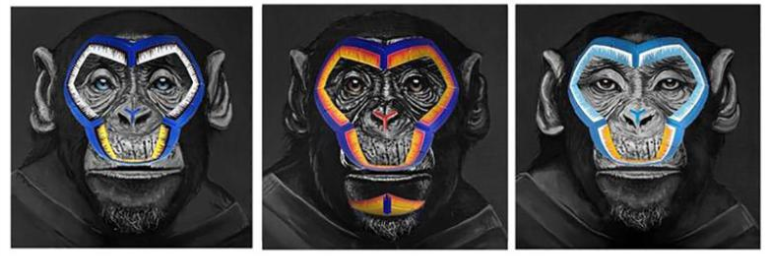
Monkey chanting is all over the news at present. This is the imitation monkey or ape noises directed against sportsmen of African ethnic origin. It is particularly common in association football and occurs all across Europe.
The recent Old Firm derby match in Glasgow provided an ideal pictorial representation of the problem:

When England played Bulgaria in Sofia recently, the match was halted twice after Black players representing England were subjected to monkey chants and Nazi salutes by some of the home support.
In Italy, the problem is widespread and Serie A, the leading professional football league in that country, decided to address the endemic racism problem on the terracing. It did not go well.
For the graphic they chose comprised three monkeys painted in different colours. There was immediate outrage across the Serie A teams and across the globe at this insensitivity. Serie A and the artist concerned, Simone Fugazzotto defended the campaign. Fugazzotto said:
Everyone was making the sound of monkeys at Koulibaly, a player I respect…so I thought I’d make this work to teach that we are all ape. The monkey becomes the spark to teach everyone that there is no difference, there is no man or monkey; we are all alike. If anything, we are all monkeys.
On the surface this seems bizarre. In an attempt to stop fans chanting to imply that black players are monkey-like, the artist chose to highlight that black players (and those of other skin shades) are indeed monkey-like. He went further and suggested that, despite the clear and huge separation between mankind and any of the animals, these distinctions are somehow trivial. Such an illogical and unscientific failure of observation suggests that there is something strange going on with the mindset and worldview of the artist in question, and with the executives in Serie A who endorsed and adopted his work.
What is the origin of this strange belief? In large measure it is Charles Darwin’s seminal work “The Decent of Man, and Selection in Relation to Sex”. In his work Darwin highlighted the beast like nature of those he termed "savages":
The main conclusion arrived at in this work, namely, that man is descended from some lowly organised form, will, I regret to think, be highly distasteful to many. But there can hardly be a doubt that we are descended from barbarians. The astonishment which I felt on first seeing a party of Fuegians on a wild and broken shore will never be forgotten by me, for the reflection at once rushed into my mind-such were our ancestors. These men were absolutely naked and bedaubed with paint, their long hair was tangled, their mouths frothed with excitement, and their expression was wild, startled, and distrustful. … He who has seen a savage in his native land will not feel much shame, if forced to acknowledge that the blood of some more humble creature flows in his veins.
He continued by comparing those elements of mankind which he deemed less evolved unfavourably to the animals:
For my own part I would as soon be descended from …[a] monkey, or from that old baboon… –as from a savage who delights to torture his enemies, offers up bloody sacrifices, practices infanticide without remorse, treats his wives like slaves, knows no decency, and is haunted by the grossest superstitions.
And he not only expressly stated that the "negro or Australian [aborigine]" lie closest to the gorilla but, most shocking of all, endorsed the extermination of that part of mankind he deemed inferior:
At some future period, not very distant as measured by centuries, the civilised races of man will almost certainly exterminate, and replace, the savage races throughout the world. At the same time the anthropomorphous apes, as Professor Schaaffhausen has remarked will no doubt be exterminated. The break between man and his nearest allies will then be wider, for it will intervene between man in a more civilised state, as we may hope, even than the Caucasian, and some ape as low as a baboon, instead of as now between the negro or Australian and the gorilla.
Hence we have, from the man who more than any other provides the origin of contemporary secular thought, the origin of the monkey chant. As the works of Darwin are close to holy writ in contemporary culture, Serie A executives could not object to the posters, for to do so would be blasphemy against the secular worldview; the now-established religion. Hence the only defence that avoids treading on Darwinism is to state that "we are all monkeys" as the artists explicitly did in defence of the campaign artwork.. This position both accepts the Darwinian worldview and ignores, tragically, its implications and genocidal potential. It clearly offers no substantial refutation of the monkey chanters on the terracing.
What is needed is a different worldview: one of a depth and solidity that is capable of challenging the current Darwinian orthodoxy.
I maintain that there is but one such belief-system available - Christianity. This contains an alternative record of the origin of mankind and of the descent of man. In this worldview, the whole of mankind descended from Noah some 4500 years ago. Hence it has only one race of man, not many. Christianity also holds that the nature of man is separate from the animals because only man is made in the image of God. It therefore provides solid reasons not to become a monkey-chanter.
This is a philosophical not a scientific issue, of course, as we are dealing with systems of belief and not matters subject to the scientific method of inquiry. It is sufficient to note, at this point, that Christianity gives a different and competing worldview, in which suggesting a man is a monkey becomes mere foolishness, if not active disrespect of the Almighty and his handiwork.
This competing worldview is perhaps best illustrated by reference to a contemporary of Darwin, Scottish missionary and Explorer David Livingstone who wrote of the Africans in quite a different manner:
For my own part, I have never ceased to rejoice that God has appointed me to such an office. People talk of the sacrifice I have made in spending so much of my life in Africa. Is that a sacrifice which brings its own blest reward in healthful activity, the consciousness of doing good, peace of mind, and a bright hope of a glorious destiny hereafter? Away with the word sacrifice. Say rather it is a privilege. Anxiety, sickness, suffering, or danger, now and then, with a foregoing of the common conveniences and charities of this life, may make us pause, and cause the spirit to waver, and the soul to sink; but let this only be for a moment. All these are nothing when compared with the glory which shall be revealed in and for us. I never made a sacrifice.
In a recent conference looking at the legacy of Livingstone, The representative of all the 73 tribes in Zambia, Her Royal Highness Senior Chieftainess Nkhomeshya Makamambo II called Livingstone a “peace broker” who had “feelings for the sufferings of others”. Her Royal Highness also said African hospitality had been crucial to his journeys, and that:
He suffered with us, we suffered with him.
Ultimately there is a choice that we have before us, we must choose one path or the other.
If we choose Darwin then the monkey chants must continue, even if quietly under the breath, for we will see the world as he saw it. Mankind is two steps up from the monkeys and one, perhaps, from the savages. With such a view it will be only too easy to point to those who look different and call them inferior, for, in the final analysis, this is core to belief in survival of the fittest and most favoured races.
Alternatively we can choose the path of Livingstone, with our minds on a higher commission that recognises the common humanity and common brotherhood of all of mankind. This worldview, whilst wary of human failings and weaknesses, values human virtues of kindness, courage and hospitality. It sees those who look different as men, not as beasts.
It is for us to choose a path, but it must be selected wholeheartedly. It is no good to select the ideology that sees people as animals and then complain when this is given voice from the terraces. And we should not expect to silence the monkey chants whilst we remain too cowed by fear of being called superstitious, uneducated or old-fashioned to argue strongly and clearly that men are made in the image of God and are not apes.
And to chant otherwise is to monkey with the truth.

